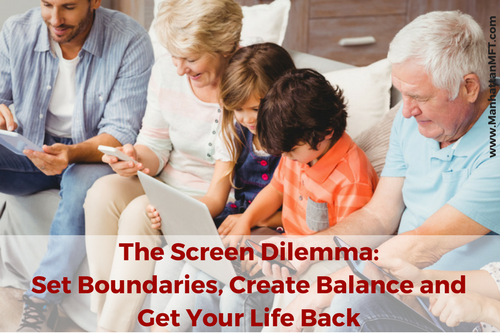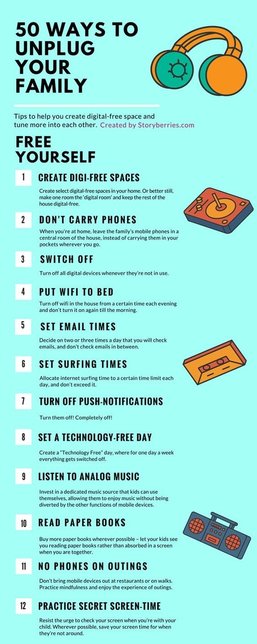E-mail, Facebook, Twitter, Instagram, online news—these are all time wasters we love to love. As a society, we have replaced human contact, rest, creativity, and quality reading for the escape into the abyss that never shuts down and is always full of bright color and lots of movements: pictures, video’s, ideas, other people's thoughts, games, links or icons. The lines become blurred between productivity and busyness, convenience and compulsion, connection and the illusion. Our hand reaches for our smartphone for the tenth time in as many minutes—why? Sometimes it seems impossible to fully shut it all down and just be—with ourselves and others. Intimacy and true connection are lost, moments of joy and significance are missed. (Check out this blog “Dear mom on the iPhone: Let me tell you what you don’t see” for more on this point.) We are irritated and overwhelmed, agitated and perplexed, flooded by more informational input in an hour than our parents would have experienced in a week. Our kids? Well, that’s even scarier. The pouty-lipped teenage beauties who can barely spell are their style icons and thought leaders (God help us!), the cyber bullying is an all-time high, and good luck getting your kids to peel themselves away from the PlayStation or iPad to have a real conversation that doesn’t involve the alphabet soup of abbreviations that mean nothing to us and everything to them. Yet, there is an undeniable comfort in being able to reach them instantly when we are apart, communicate in THEIR language (hello bitmojis!), and give them access to useful and enriching content (SAT prep apps!) or entertainment at a time when we need some peace and quiet. So, how do we make the most of the good and not let the bad ruin it all? It starts with parents. Still with us? Whew! We thought we’d lost you there! Take a look at what you are modeling. If you are telling kids to get off the computer, but stay glued to your phone meanwhile—you are sending a mixed message. Model what you want your kids to do. 1. Set limits with your screen time. Make a point to have eye contact with friends and family. Make a point to have time when a screen is nowhere in sight. Notice what you’re feeling when you reach for a screen? Are you looking to avoid something, check out? Even the awareness of when you’re going for a screen for a good use versus an unhealthy use will help you make a different choice. If I recognize that I'm reaching for the screen because my partner or kids are driving me nuts and I can't take it, I now have a different situation than if I'm reaching for the phone to meet a work deadline and really want to spend quality time with my partner or kids. 2. What are the consistent boundaries you and your partner are willing to have with the kids' screen time? The Kaiser Family Foundation conducted a study and found that kids who have more screen time have lower grades, reduced personal contentment, and spend less face time with friends. As tempting as it may be to institute draconian rules after reading that, parents have to find boundaries they both agree with and are both willing to enforce. Ideally there should be limits to how much time children are allowed to spend with a screen and what content is permitted. (Tips: Homework is different than gaming. And, yes, even music should be turned off for it to count as truly screen-free time.) Here are some examples of limits:
Check out this infographic from www.storyberries.com for more great digital detox ideas. 3. Implementation is key. Sometimes we try to change the game too quickly or we throw out a half-baked rule and hope that it sticks. We suggest making an intention - devise a family screen declaration or contract. The declaration is an honest open intention parents share with the kids. Something like: "we've been talking and decided the screens are taking too much time and mind power for all of us. We want us to have more time together and time for other interests. Here is what we have come up with…” Download Electronics and Internet Family Declaration and Usage Policy template As with any detox, the new modus operandi would ideally start with a complete abstinence, the pulling of the power cord out of the wall for the weekend, the week, or the day. 4. Declare your non-negotiables. Write them down, be very clear and specific so there’s no confusion or mind games later. Also include the consequences for not following through with the declaration- for both parents and kids. Invite the kids to participate in the declaration by contributing their ideas. Write them down. Then comes the hardest part of all... follow through. When someone is not following the declaration (and they will!), it is up to both parents together to say/do something. It shouldn’t be aggressive or hostile, but should sound something like “I really want us to honor our commitment to the screen declaration, so you are going to have to shut things down now.” Invite them to do something else instead: help with dinner, play catch, talk. If they don’t cooperate, then the consequences should be enforced. If there is a more serious problem with getting your kids off the screen, there may be a bigger issue. Some kids will avoid feelings of depression, anxiety, worry, and fear, or situations of family conflict, bulling, learning problems by escaping into gaming or other screen activities. If parents are worried that this might be happening, it's important to offer support, a safe forum for them to share, and resources like family therapy. Download a template of Electronics and Internet Usage Declaration and Safety Guidelines Download a printable version of this blog. Comments are closed.
|
Categories
All
Archives
March 2023
|
[email protected]




 RSS Feed
RSS Feed